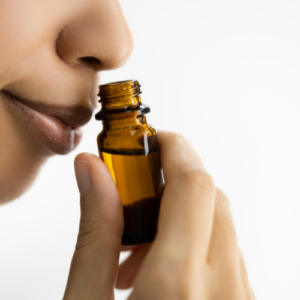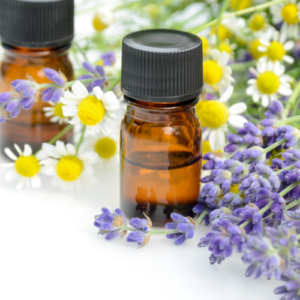How Essential Oils Work
Essential oils are highly concentrated extracts from plants with natural fragrance and beneficial properties. These oils offer several mechanisms to promote wellness, including aromatic, topical, and other applications. Remember this is just an overview of how essential oils work and not a complete and in-depth study, to do that it is best to pursue aromatherapy education.
Here’s how essential oils work:
Aromatic Application:
Inhalation: Inhaling essential oils’ aroma allows the scent molecules to travel through your olfactory system and reach the brain’s limbic system, which is associated with emotions, memory, and mood regulation. Inhalation of essential oils can evoke emotional responses and influence mood.



Topical Application
Absorption through the Skin: Essential oils can be absorbed through the skin. Applying essential oils topically allows the oil’s molecules to penetrate the skin and enter the bloodstream, where they can exert their effects throughout the body. This absorption is not as extensive as it sounds in some books. Learn more in an Aromatherapy course.
Local Effects: Essential oils can have localized benefits when applied to specific areas. For instance, applying lavender oil to the skin may promote relaxation and soothe skin irritations.
Effect on Cellular Level
Essential oils contain compounds that interact with cells at a molecular level. These compounds may have antimicrobial, anti-inflammatory, or antioxidant properties, contributing to various health benefits.
In addition, essential oils contain other active compounds, and their effects can vary based on the specific chemical composition of the oil.
Supporting Health and Well-being
Essential oils are believed to support health and well-being through their diverse properties. For example, tea tree oil is known for its antimicrobial properties, lavender oil for relaxation, and peppermint oil for its refreshing and digestive benefits. Some essential oils may have adaptogenic properties, helping the body adapt to stress and promoting balance.
Antimicrobial Properties
Many essential oils possess antimicrobial properties that can help fight bacteria, viruses, and fungi. For instance, tea tree oil is known for its antibacterial and antifungal effects.
Stimulating the Nervous System
Certain essential oils, such as peppermint or citrus oils, are known for their invigorating and uplifting effects. These oils can stimulate the nervous system and promote alertness and mental clarity.
Individual Response
The effectiveness of essential oils can vary from person to person. Moreover, individual sensitivity, health status, and personal preferences affect how someone responds to a particular oil. When they are ill or pregnant, people may react differently to essential oils than they normally would.
It’s important to note that while essential oils have potential benefits, they should be used with caution. Dilution and proper application methods are crucial to ensure safety. Additionally, some individuals may have sensitivities or allergies to certain essential oils, so it’s advisable to perform a patch test and consult with a healthcare professional, especially during pregnancy or if you have pre-existing health conditions.
Disclaimer
Disclaimer Blog
The information presented on the Heart of Herbs Herbal School/Demetria Clark websites is for educational purposes only. Heart of Herbs Herbal School/Demetria Clark Education LLC makes neither medical claims nor intends to diagnose or treat medical conditions. Links to external sites are for informational purposes only. Heart of Herbs Herbal School/Demetria Clark neither endorses them nor is in any way responsible for their content. Readers must do their own research regarding the safety and usage of any herbs, recipes, or supplements.
